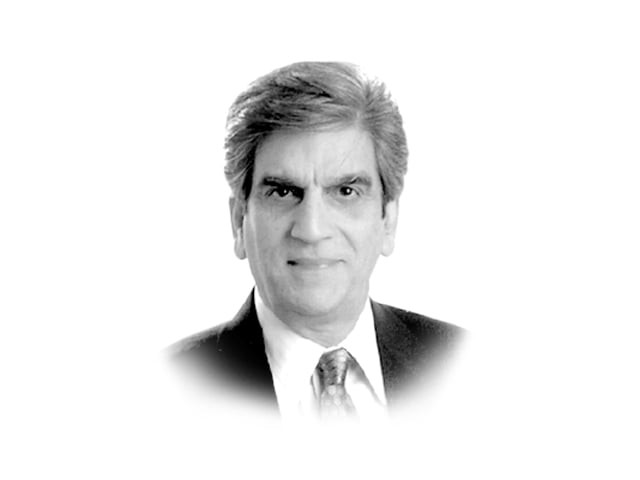Please don’t blame the IMF for everything
IMF’s imprint on our macroeconomic policies has been marginal and fleeting at best.

Ms Naqvi’s first sentence that the IMF has had a “key influence” on the conduct of macroeconomic policies in Pakistan leaves me bewildered. Considering we have never implemented an IMF-financed programme (save the one during the previous regime — or so it is claimed), this postulate has no merit at all. However, I will concede that some reforms were undertaken as part of our agreements with the IMF in the areas of central bank autonomy, prudential supervision, open market operations, interest and exchange rate flexibility, and privatisation (even if that was handled by financing from the World Bank). In other areas, and especially on the fiscal side — the mother of all evils — Pakistan has implemented absolutely nothing, despite IMF conditionality. Indeed, if anything, we keep regressing, adding new exemptions, concessions and amnesty schemes, so that we have the most regressive, distortionary, dysfunctional, fragmented and corrupt fiscal system in the world.
So I would put it to the writer that the IMF’s imprint on our macroeconomic policies has been marginal and fleeting at best. It is for a very good reason that Pakistan has been given the undistinguished title of a country characterised by “start-stop adjustment” in the IMF. Actually, I prefer the description “start-stop-roll back”. As soon as we have abandoned (another) programme, we roll back any reforms that we may have implemented. Removing exemptions and concessions and then promptly restoring them is a case in point.
Ms Naqvi talks of counter-cyclical fiscal policy and how the IMF simply does not get it. This point has been mentioned by others. Indeed, in the case of one specific person, he said that Pakistan should have rejected the IMF’s recommendations to tighten both fiscal and monetary policies in the context of the 2008 stand-by arrangement because it was bad for growth. I say to both Ms Naqvi and the gentleman that their recollection of the conditions prevailing at the time is a little blurred. The facts were that, prior to the engagement with the IMF in 2008, the Pakistan economy was heading off a cliff: growth had slowed, inflation was accelerating, there was massive capital flight, asset price bubbles had burst, the exchange rate was in free-fall and our foreign exchange reserves were disappearing at an astonishing speed.
Given this grim picture, does Ms Naqvi seriously think that a counter-cyclical fiscal stance (and, as a sweetener, a dash of monetary easing as well), would have been the right policy prescription? Or would such an injection of stimulus have done no more than hasten the plunge off the cliff? Would this be the right policy prescription again today with an FY12 budget deficit clocking in at 8.5 per cent of the GDP, inflation in double-digits and our foreign exchange reserves under immense downward pressure?
It is true that there were countries that had built-up “fiscal buffers” prior to the global financial crisis of 2008 and had room to manoeuver. China and India come to mind. Both countries had the “fiscal space” for discretionary policy action and were able to safeguard their growth and development objectives. Pakistan did not. The Pakistan economy was over-stretched, overheating and in peril. It had no choice but to undertake drastic adjustment measures to halt the downward spiral.
Ms Naqvi is harsh on “IMF-imposed” cuts in development. But her angst is misdirected. Based on experience, the prerogative of where and how much to cut on the spending side is that of the authorities, not the IMF. They certainly make suggestions and typically focus on non-interest current spending. It will also do well to note that the World Bank — and the Asian Development Bank — are at the negotiating table to ensure, inter alia, that development spending is not unduly compressed for the sake of “fiscal adjustment”. Cutting development spending, or delaying the release of funds to projects to meet fiscal targets is an entirely “home-grown” Pakistani initiative. Yet, the irony is that despite across-the-board cuts that are disruptive and destructive, we still failed to meet fiscal deficit targets!
Ms Naqvi then has a predictable dig at another “IMF favourite”, as she calls it, of cutting subsidies. The IMF is not against subsidies. It is, however, very much against open-ended, untargeted and burdensome subsidies that benefit primarily the rich. Most level-headed economists would be too. On her additional point about PSE’s (public sector enterprises) becoming “national champions”, I would ask her how she would rate our “national champions” of today: PIA, the railways and the Pakistan Steel Mills? Should we just hang on to these dying “national champions”?
Finally, if the writer thinks that the persistence of double-digit inflation in Pakistan has very little to do with fiscal slippages (and how they are financed), and everything to do with domestic and external shocks, I recall a story told to me about a meeting of the Economic Committee of the Cabinet (ECC) which Ms Benazir Bhutto chaired. She was being assured that inflation was being caused by “the price of onions and potatos”, and had nothing to do with the stance of macroeconomic policies. With economic advice like that, no wonder her government was toppled twice.
Published in The Express Tribune, September 10th, 2012.















COMMENTS
Comments are moderated and generally will be posted if they are on-topic and not abusive.
For more information, please see our Comments FAQ